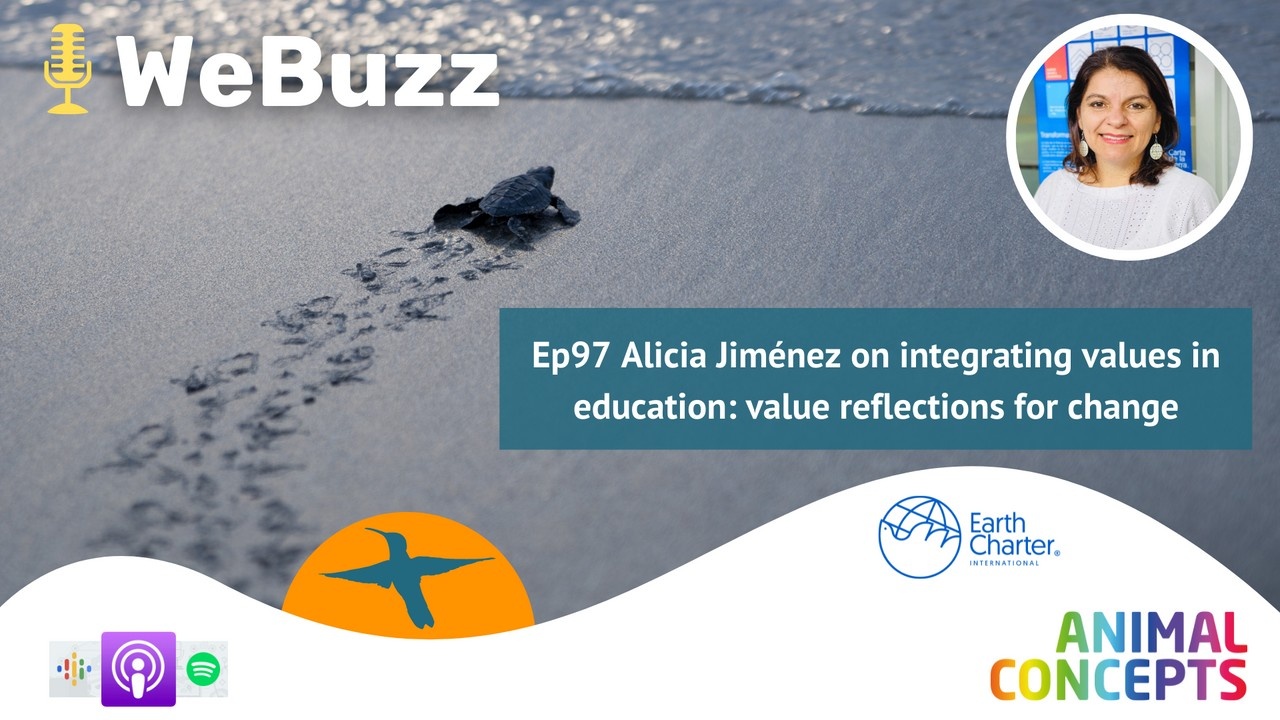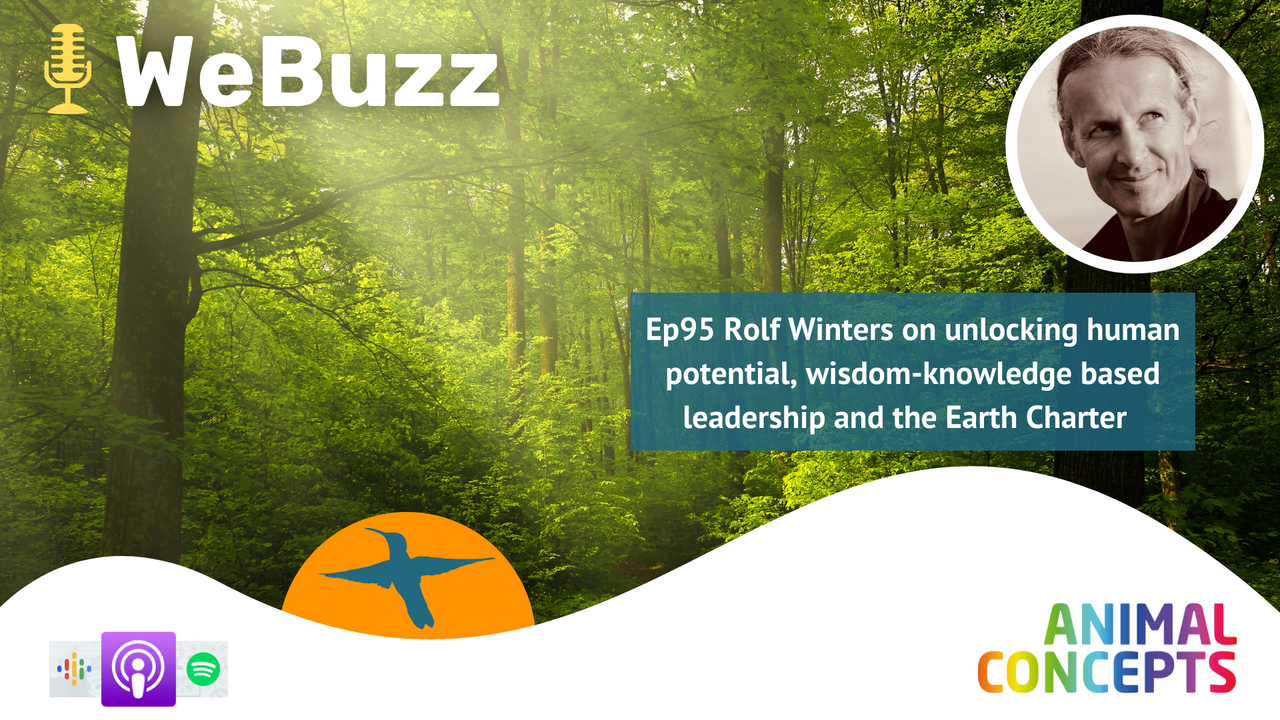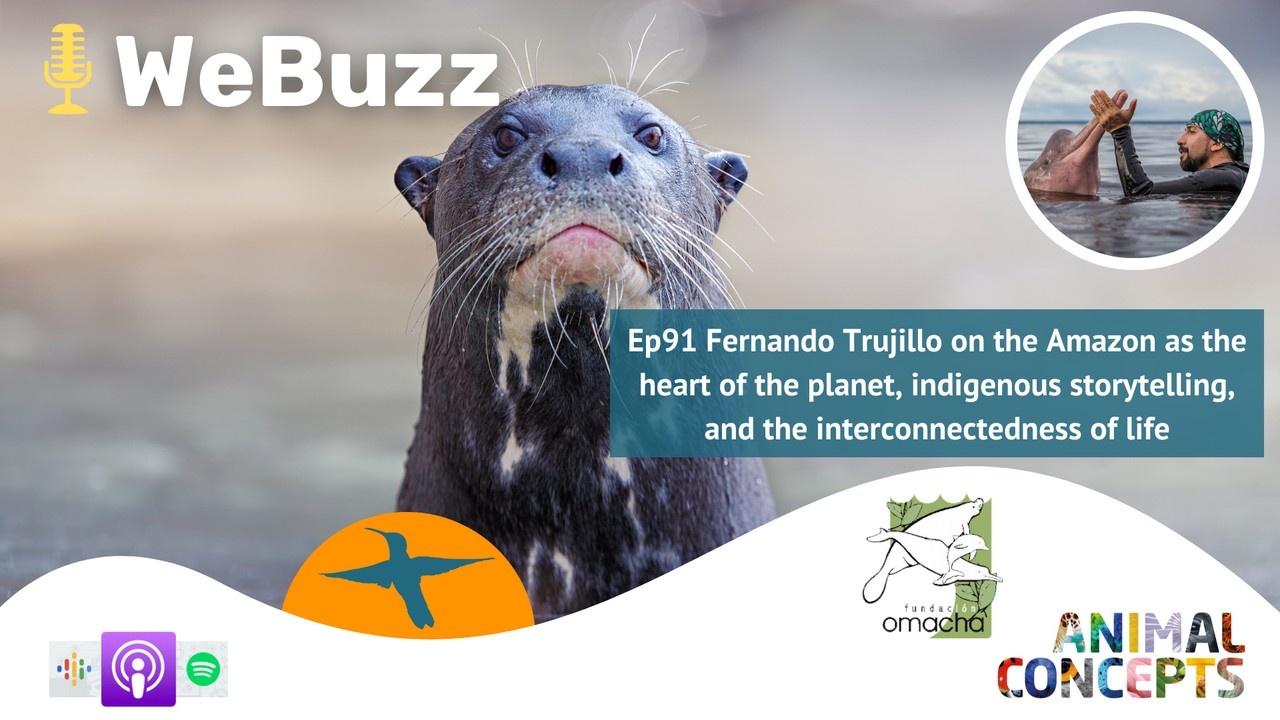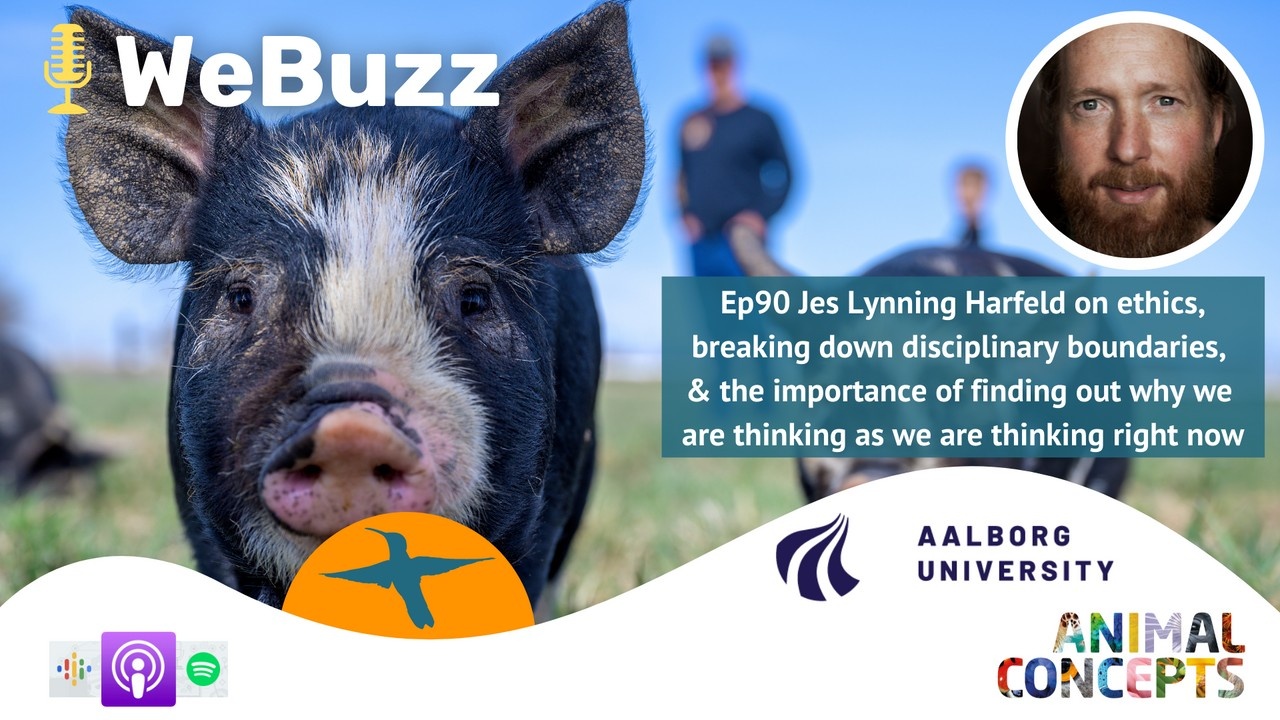Ep97 Alicia Jiménez on integrating values in education - value reflections for change

“Education can change minds, if you can change minds, you can change mindsets, you change the behaviours and change the collective, so it is crucial”. - Alicia
This week’s podcast utilises the audio from the webinar interview led by Alicia Jiménez which took place on the 29th of January 2021 from the AnimalConcepts platform.
Let us welcome Alicia Jiménez, the Director of Programmes at the Earth Charter International Secretariat in Costa Rica. She has been working in the field of conservation and sustainable development since 1998.
The conversation discusses why it is essential to work together to maintain nature. However, this would require a new mindset, through cultural transformation to expand our perception and rethink our values. Education is a key player in this and can influence change. The Earth Charter can be used as a guideline to produce lessons.
The Earth Charter is a working document, containing sixteen principles within four pillars in sixty languages to promote a glo...
Ep95 Rolf Winters on unlocking human potential, wisdom-knowledge based leadership and the Earth Charter

“Crises offer an invitation to do things differently. Embracing this opportunity clearly demands an overhaul of what is considered ‘leadership’ in our society. We need to up our game! What we need are masterful warriors with a crystal clear vision and the ability to incite the necessary inspiration, creativity and faith that catalysis transformational change. We need wise leaders instead of smart managers.” - Rolf Winters
Let us welcome Rolf Winters to WeBuzz. He is an explorer of life, a leadership coach, a public speaker, and Wise Leaders Ltd founder.
Rolf starts by explaining how the meaning of success is fluid and changes every few years, as well as being subjective to the individual and what they had aimed to achieve. He explains how in his profession, he aims to promote the spirit of an individual and groups.
Rolf shares with us about when he and his family lived with a clan of native Americans. They took themselves out of the Western system to live with nature and learn a ne...
Ep94 Mirian Vilela on the Earth Charter, storytelling to promote system thinking, and relationships with everyone including the Earth

"It’s important to emphasise that a key purpose of the Earth Charter is to expand and deepen a consciousness with regards to how we ought to relate not only with ourselves, and with others, but also how we ought to relate with the large living world." - Mirian Vilela
Let us welcome Mirian Vilela who is the Executive Director of the Earth Charter International Secretariat and the Centre for Education for Sustainable Development at the University for Peace (UPEACE). Additionally, Mirian coordinates the UNESCO Chair on Education for Sustainable Development with the Earth Charter.
Mirian first introduces us to her upbringing in Brazil on her father's farm, and how this cultivated a connection to nature.
Irma and Mirian then discuss what is the Earth Charter, how it was born from common human shared values and how the Earth Charter played a key role in Mirian’s life, giving her a voice. They also share the importance of telling stories to promote system thinking to establish relationship...
Ep93 Grian Cutanda on social and environmental activism, storytelling, and the Earth Stories

Grian A. Cutanda has a PhD in Social Education from the University of Granada (Spain) and a Degree in Psychology from the University of Valencia. He is an author of fiction and essay, with 16 books published, some of them translated into 12 languages, and a number of academic papers and chapters at the request of various universities. To highlight his international bestseller The Gardener, published in English by Thorsons (HarperCollins) in 1998.
Social and environmental activist, Grian has been an organiser and coordinator in different fields within social movements such as the Indignados Movement in Spain, forerunner of the Occupy Movement in 2011; the People’s Climate March in 2014 and the subsequent 2015 climate campaign in Edinburgh (Scotland); and Extinction Rebellion, as co-founder of XR Spain and regional liaison for Latin America in XR International. The impact of his environmental activism reached an international level with a documentary screened at the Royal Anthropologica...
Ep92 Charlotte Corney about growing up in a zoo, the Wildheart Animal Sanctuary, and the SERVIVAL campaign

Let's welcome Charlotte Corney, the former CEO of the Wildheart Animal Sanctuary in the Isle of Wight and the founder and trustee of the Wildheart Trust.
Charlotte tells us of what it is like growing up in the Isle of Wight Zoo (now the Wildheart Animal Sanctuary), and how agreeing to hand-raise Zia the Tiger cub committed herself to work with animals. She explains the journey from a zoo to a sanctuary, yet emphasises that throughout the sanctuary's history, each animal's life has always mattered.
“One thing, to this day, remains absolutely unshiftable, and that is that individual life matters to each and everyone of our animals, and never ever were our animals a commodity. The animal's life always comes first”.
Each animal in their care acts as an ambassador animal to promote the conservation and protection of animals. Charlotte gives us an example of SERVIVAL, a campaign to ban the breeding of exotic felids, such as Servals, with domestic cats. These ambassador animals contribute ...
Ep91 Fernando Trujillo on the Amazon as the heart of the planet, indigenous storytelling, and the interconnectedness of life

“Most people used to say, the Amazon is like the lung of the planet. I say it is like the heart. If you see the Amazon, you can see a heart and all the rivers are like veins. When you clog all these veins, the body is going to collapse. This is happening now."
Let us welcome Dr Fernando Trujillo, a marine biologist who is the Scientific Director of Foundation Omacha, an NGO he established in 1993 to promote the conservation of river species and their ecosystems in South America.
Fernando guides us through his studying history, achieving an MSc in Environmental Sciences (University of Greenwich) and a Doctorate in Zoology (University of Aberdeen) with the ambition of working with marine vertebrates. He was encouraged to work with dolphins in the Amazon. Although nervous, this place became his paradise so built his career around it. Fernando’s PhD allowed him to research Amazon River Dolphin behaviour, and habitat use and develop a technique to count them. From here, he developed the S...
Ep90 Jes Harfeld on ethics, breaking down disciplinary boundaries, & the importance of finding out why we are thinking as we are thinking right now

“I think one of the things we should do, and that I am experiencing more and more, is that, in order to think differently we have to look to the past, to find out why we are thinking as we are thinking right now”.
Let us welcome Jes Lynning Harfeld, an associate professor of applied ethics at the Centre for Applied Philosophy at Aalborg University, Denmark. Currently, his research focuses on the connections between animal welfare and ethics in the realm of human-animal interactions and the way that language interacts with thinking and character.
It was not until Jes’s PhD when he came across Peter Singer’s Animal Liberation, did he develop an interest in the ethical dilemmas regarding animal welfare. As such, he focused his thesis on the ethical dilemmas of modern agriculture. Querying, what it means to have a find and the different approaches of ethics and how it relates to animals. “Animal welfare understandings as types of interpretations, reading their signals then jumping to con...
Ep89 on gratitude and celebrating 2-years of online platforms through global collaborations for peoples, animals & the planet we share

“That is the real beauty, we often talk about global collaboration for animal welfare, or global collaboration for human wellbeing or for the greater community of life, or the planetary… What makes it so strong, is these different expertise, these different interests, these different talents, these different things that people bring… to effect change and the only way we can do that, is of course, is by doing it together.” - Sabrina Brando
Ep88 Suzanne Gendron on the importance of informal education in conservation activities

“We have a mission to connect people with nature to inspire stewardship for nature through those connections!... An emotional connection with nature through spending time in nature is more important than environmental education for inculcating that sense of stewardship in children… an important part of conversation”. - Suzanne Gendron
Let us welcome Suzanne Gendron, the Director of Sage Advice Consulting and the Former Executive Director of Zoological Operations and Conservation at Ocean Park Hong Kong.
In this episode, Suzanne shares with us the importance of educational opportunities outside of school to promote stewardship through creating a connection to nature.
Suzanne explains how Ocean Park aims to support Asian biodiversity and the strategies it has implemented to achieve this. She highlights crucially how conservation problems are not going to get better without cooperation.
Suzanne then shares some of the educational activities Ocean Park employs to inspire others to tak...
Ep87 Sabrina Brando on human wellbeing, empowering people, being a force for good, & love in the workplace

Sabrina Brand on human wellbeing, empowering people, being a force for good, & love in the workplace
"What all people need most is to feel loved (Baer, 2011). Today a deep and true culture of care is about love in the workplace." - Sabrina Brando
Join Sabrina Brando in thinking about human wellbeing, specifically in the workplace, the importance to empower people, and how love, care, and respect are fundamental for community.
Sabrina discusses the need to be open, to keep listening, to stay connected, and to understand the needs of the people who are in direct contact with animals, visitors, and other important frontline professionals.
She briefly discusses different dimensions of and approaches to human wellbeing which all have a place and require attention at an individual and organisational level, including being a trauma-informed workplace.
This brief podcast continues to conversation started in Ep56 and Ep86 and sets the stage for more episodes and other communications in the...

